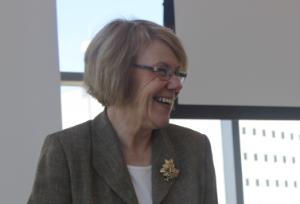Barbara Schaal looks forward to the day when she will be known as simply one of the most distinguished scientists in the world – rather than a pre-eminent female researcher, or the first woman to serve as vice president of the National Academy of Sciences.
Schaal, dean of the Faculty of Arts & Sciences at Washington University, is an internationally known evolutionary plant biologist. She splits her time between the St. Louis campus – where she heads a dynamic lab investigating plant evolution and diversity, in addition to her leadership role – and Washington, DC, where she is active in the NAS and the President’s Council of Advisors on Science and Technology (PCAST).
 Schaal was at UM for a two-day visit, focusing on initiatives to increase diversity in sciences, promote awareness on related issues and to inspire students and young scientists toward bright careers beyond gender or ethnicity biases. Her visit was co-hosted by: the Scientists & Engineers Expanding Diversity and Success (SEEDS) program and the RSMAS Diversity, Equity and Inclusion Committee (DEIC). SEEDS aims at increasing the representation of women and underrepresented minorities in the sciences and encompasses the College of Arts & Sciences, the College of Engineering, the Miller School of Medicine, and the Rosenstiel School. The RSMAS DEIC works at promoting an environment in which every member of the RSMAS community is valued, pursuing appropriate programs to fulfill the commitment to caring for the diverse faculty, staff and student bodies. On Thursday, Schaal visited the RSMAS campus and was the first speaker on the newly established Distinguished Lecture series on career and leadership.
Schaal was at UM for a two-day visit, focusing on initiatives to increase diversity in sciences, promote awareness on related issues and to inspire students and young scientists toward bright careers beyond gender or ethnicity biases. Her visit was co-hosted by: the Scientists & Engineers Expanding Diversity and Success (SEEDS) program and the RSMAS Diversity, Equity and Inclusion Committee (DEIC). SEEDS aims at increasing the representation of women and underrepresented minorities in the sciences and encompasses the College of Arts & Sciences, the College of Engineering, the Miller School of Medicine, and the Rosenstiel School. The RSMAS DEIC works at promoting an environment in which every member of the RSMAS community is valued, pursuing appropriate programs to fulfill the commitment to caring for the diverse faculty, staff and student bodies. On Thursday, Schaal visited the RSMAS campus and was the first speaker on the newly established Distinguished Lecture series on career and leadership.
She said times have changed significantly since she was first hired by The Ohio State University, after earning her Ph.D. in Population Biology from Yale in 1974. She was the only woman in the Department of Botany. “I just did my research,” Schaal said, adding, “I ultimately wanted to be ‘one of the colleagues.’”
In her lab now, she often has an equal number of female and male graduate students, and she is able to select the most qualified research assistants – regardless of their gender.
In her capacity as a member of PCAST – an advisory board of highest-level scientists from across the country that makes policy recommendations to President Obama on science, technology and innovation – Schaal was a key contributor to its recent report on Agricultural Preparedness and the Agriculture Research Enterprise.
The report addressed genetically modified (GM) plants, among other issues. Although this can be a divisive issue, Schaal said, “GM presents tremendous benefits, but we must look at it very carefully.”
She said GM plants offer opportunities for “better nutrition, and less environmental destruction.” As an example, she cited efforts to create cassava plants in Africa that provide more vitamins and proteins; as this crop is a staple food for many people, this would positively impact health in the region.
Schaal added that GM plant breeding differs from traditional breeding only in the speed with which results can be achieved and the precision of the breeding process.
She added that President Obama has met frequently with PCAST members, and that he is very receptive to the group’s policy advice.
Although it is a challenge to balance her work on campus with her work in Washington, Schaal said, “It is an honor to work in DC with the National Academy and PCAST – and I love my university. I have had so many opportunities.”
SEEDS is funded by a grant supporting women in science from the National Science Foundation and UM Provost Thomas LeBlanc, SEEDS focuses on three areas:
* Programming to support the female and minority scientists on campus, such as the “You Choose” grants provided to individuals who wish to develop community events and resources around the sciences;
* Mentoring opportunities (both one-on-one and in peer groups) for the University of Miami community; and
* Human resources support to help departments hire and retain qualified female and minority candidates.
Schaal said all three of these areas are crucial. “When (a university is) trying to attract an underrepresented group, you need a full court press,” she said, adding, “Activities where people come together are important to creating a like-minded community of support.”
As the presenter in the SEEDS Distinguished Lecture Series, Schaal discussed her research on the domestication of rice 10,000 years ago. She uses genomic markers to track the genetic structure of rice, the most important crop in the world. Rice feeds nearly half of the world’s population, about 3.5 billion people.
At the conclusion of Schaal’s remarks, Professor Kathryn Tosney, chair of the Department of Biology at UM’s College of Arts & Sciences and director of the SEEDS program, said, “Two things characterize great scientists: clarity of thought, and enthusiasm for the research.” She noted that Schaal’s speech was peppered with exclamations “It’s fun!” and “It’s cool!”

